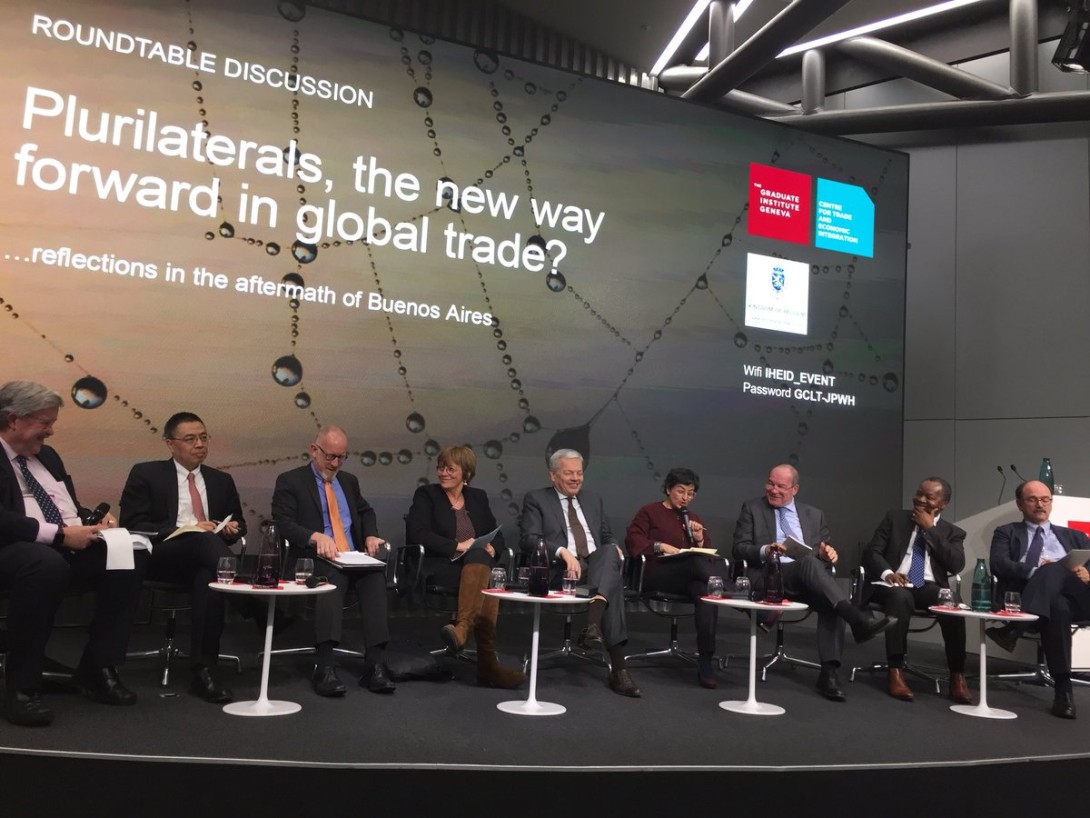In scales and makeup of trade negotiations, for Least Developed Countries (LDCs) there is more than meets the eye
At the World Trade Organization's conference in Buenos Aires in December 2017, various developments emerged during the discussions, with member countries coming together in assorted coalitions and small assemblies to talk trade – and emerging with joint statements and initiatives.
On 28 February in Geneva, a panel of experts discussed the merits of these so-called plurilaterals. Speakers such as WTO director general Roberto Azevêdo, EU ambassador to the WTO Marc Vanheukelen, International Trade Centre executive director Arancha Gonzalez and Eloi Laourou, Benin's ambassador to the WTO, debated the potential impact on the WTO's foundational multilateralism.
But for the Least Developed Countries (LDCs) and their specific sets of trade needs, what does this herald? And what does this mean for the global trading system?
REVERBERATIONS
At the event titled "Plurilaterals, the new way forward in global trade? … reflections in the aftermath of Buenos Aires," WTO director general Roberto Azevêdo closed the discussion with a call for flexibility, saying, "Flexibility will not lead to fragmentation. In fact, in a system with 164 members of different sizes, different priorities and different stages of development, flexibility is precisely the way to avoid fragmentation."
For panellist Laourou, who is board chair of the Enhanced Integrated Framework (EIF), both those different stages of development and that flexibility are key when considering impacts on his country and fellow LDCs.
"Nobody should be left behind," Laourou said during the discussion at the Graduate Institute of Geneva, stating that multilateralism offered the best option for LDCs because of the safeguards for developing countries, including special and differentiated treatment provisions.
"Flexibility will not lead to fragmentation. In fact, in a system with 164 members of different sizes, different priorities and different stages of development, flexibility is precisely the way to avoid fragmentation."
Roberto Azevêdo, Director-General of the WTO
He said any trade talks need to recognise where emerging economies are coming from, and take into account differing levels of development, noting agriculture, the digital divide and infrastructure as spaces where LDCs require additional support.
Vanheukelen also referenced this issue, saying, "The trade system's been struggling since the 1960s to properly take different economic levels into account when setting the rules. We have to have another go. We need to get an open, fair handle on the question of differentiation."

OLD AND NEW
Many on the panel emphasized that plurilateral trade discussions were not a new phenomenon, as well as indicating that the WTO's multilateral structure offered necessary transparency and binding rules.
United Nations Conference on Trade and Development (UNCTAD) deputy head Isabelle Durant said, "we live in a globalized world. That means that only global solutions and global answers are the good ones. We need to get better at fixing the global machine."
Those fixes include avoiding the misuse of consensus, forced negotiations or the imposition of views onto others, many on the panel noted.
"We live in a globalized world. That means that only global solutions and global answers are the good ones. We need to get better at fixing the global machine."
Isabelle Durant, Deputy Secretary-General of UNCTAD
Gonzalez said that consensus in multilateral agreements does not mean unanimity and there was risk in conflating the two, and that the WTO, "is not the only multilateral system that is facing this kind of questioning."
The WTO and trade don't sit in isolation, she said, adding that trade issues intersect with scores of other matters the world is grappling with today, including equality and the environment.
MINDING THE GAP
In an interview following the discussion, Laourou said, "at the WTO there are many countries that have different levels and capabilities and these underdeveloped countries are very weak or vulnerable, so they have to be supported in their efforts to produce and to export and they should not be forced to contribute the same as the other members... This flexibility across the different agreements should be provided to them."
He added, "special and differentiated treatment is about commitment and flexibilities in commitment in terms of duration or implementation, and also the level of commitment for instance for tariffs for domestic support, they should be exempted from commitments."
He said LDCs were most comfortable with the multilateral system, and went on to reference ecommerce, sanitary and phytosanitary issues and investment facilitation for development as items being negotiated under the multilateral umbrella. Plurilateral negotiations are optional and anyone can take part, he added, but the results should be fair and equitable for LDCs and need to be embedded in the multilateral system.
Azevêdo said of current plurilateral initiatives in his remarks, "let me be clear that simply because these discussions are under way it does not mean abandoning issues that are already on the table and that need to see progress. This includes issues that are very dear to WTO members, developed and developing, such as domestic support in agriculture, food security, and development, among others."
And these are the key concerns for LDCs as elaborated by Laourou, who noted the need for results in the agricultural sector and the obligation to bridge the digital divide, so trade and export innovations from LDCs can surface, and aren't lost to an ocean of technology gaps.
Watch the recording of the panel at The Graduate Institute of Geneva here.
If you would like to reuse any material published here, please let us know by sending an email to EIF Communications: eifcommunications@wto.org.



